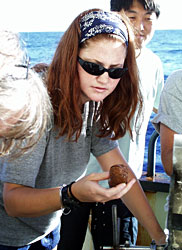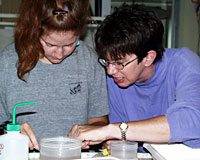|
Interviews: Graduate Student Zoe McKinness
 Zoe McKiness grew up in Des Moines, Iowa and currently lives in Boston, where she is working for her Ph.D. She started college as a pre-med student, but decided to go to graduate school instead of pursuing medicine after taking an evolutionary biology course her junior year. She entered Harvard in 1999 and hopes to finish her research there in 2004. When she is not teaching or doing research, she likes to run and paint. Zoe McKiness grew up in Des Moines, Iowa and currently lives in Boston, where she is working for her Ph.D. She started college as a pre-med student, but decided to go to graduate school instead of pursuing medicine after taking an evolutionary biology course her junior year. She entered Harvard in 1999 and hopes to finish her research there in 2004. When she is not teaching or doing research, she likes to run and paint.
Question:
Why did you choose Harvard?
Zoe:
I wanted to work with Colleen Cavanaugh, who is a professor of biology at Harvard. When I was applying to graduate school, I figured out what I was interested in and then I started researching people who worked in that field and the resources available at different schools. I really wanted to study the evolution of symbiotic interactions at hydrothermal vents so I read about the different approaches of scientists in the field. I liked Colleen’s work because she focuses on the symbionts (the bacteria) instead of the hosts (the animals) and concentrates on evolution and ecology, as opposed to physiology. So I contacted Colleen and then I interviewed with her to discuss her work and my interests.
Question:
You study symbiotic bacteria living at hydrothermal vents. How did you become interested in this?
Zoe:
It really struck me that bacteria have this huge amount of evolutionary and physiological diversity yet people still have so much to learn about what bacteria are in the environment and what they are doing. I felt compelled to pursue microbial ecology and when I was doing a literature research, I came across the hydrothermal vent ecosystems. It caught my attention. I was intrigued by this huge amount of information that I was ignorant of, and I really liked the fact that studying vent ecosystems requires an interdisciplinary approach. You have to understand the geology and the chemistry to really understand what’s going on with the biology.
Question:
What does it take to get into Harvard?
Zoe:
Grades, GRE scores and essays are important, but so is your previous research experience. The admissions committee and the department you are applying to need to see what kind of independent research you have done. They want to see what kinds of questions can you come up with on your own and evaluate your critical thinking skills, as well as judge your lab experiences. I had done an internship in a natural history museum, studying the evolution of poisonous spines in sea urchins, and I had done work while in college in my undergraduate advisor’s lab studying molecular evolution in wasps.
 |

|
| Zoe and her advisor, Microbial Biologist Colleen Cavanaugh, examine organisms collected from the Edmond field vent. |
Question:
Tell me about your high school coursework.
Zoe:
I actually graduated high school with six years worth of science classes. I was really lucky because my high school had an incredible science department and I was able to take AP (Advanced Placement) classes, too, which prepared me well for college courses. Another important part of my high school career was English. I had amazing teachers who taught me that writing well is one of the most important skills for any field.
Question:
What is an average day like for you in graduate school?
Zoe:
I have a lot of flexibility with my time, which is great. Most of my time is spent in my lab but I am doing different things every day depending on which projects I am working on and whether I am getting ready to go on a cruise or go to a meeting. I take classes, too, but most of my time is devoted to research. I also teach classes, which I really enjoy.
Question:
You have a few more years remaining in your graduate program, but have you thought about your plans when you finish?
Zoe:
I’m still working on that plan. Right now I think I will do post-doctorate research then try to get a job as a professor and teach at a college, but I have a lot of time to think about exactly what I want to do. There are a lot of options; you can take a research position at a museum or research institution, a teaching position at a university or college, or go to industry and work in a lab for a biotech or pharmaceutical company. I really would like to stay in academia, either as a professor or research associate.
Question:
What are your plans after this expedition?
Zoe:
I am going to be taking my qualifying exam when I return to school. This is an oral exam with a committee of my advisor and three other professors. You need to pass your qualifying exam in order to continue on to do your thesis work. After that, I am headed back to sea at the end of June, for a cruise on the Mid-Atlantic Ridge. I haven’t been to the Atlantic hydrothermal vents before and I am really looking forward to this cruise.
Question:
What advice do you have for students entering high school who may have an interest in becoming a scientist?
Zoe:
Be curious! There is a whole world of knowledge out there and so much to learn. Take the time to enjoy your classes and read everything you can. The more you read, the more you will discover about whatever you are interested in and you will be able to ask more questions. Eventually you will find questions that you can’t answer. That is the exciting part.
Also, if you are really interested in doing scientific research, volunteer to do work in a lab in a university or hospital nearby. Many universities have summer programs for high school students that are wonderful because you get to meet professors and use their lab facilities.
|

